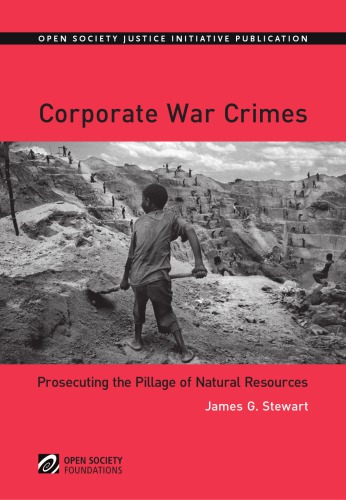Product desciption
Corporate War Crimes Prosecuting The Pillage Of Natural Resources Stewart by Stewart, James G 9781936133321, 1936133326 instant download after payment.
Pillage means theft during war. Although the prohibition against pillage dates to the Roman Empire, pillaging is a modern war crime that can be enforced before international and domestic criminal courts. Following World War II, several businessmen were convicted for commercial pillage of natural resources. And although pillage has been prosecuted in recent years, commercial actors are seldom held accountable for their role in fuelling conflict. Reviving corporate liability for pillaging natural resources is not simply about protecting property rights during conflict--it can also play a significant role in preventing atrocity. Since the end of the Cold War, the illegal exploitation of natural resources has become a prevalent means of financing conflict. In countries including Angola, the Democratic Republic of the Congo, East Timor, Iraq, Liberia, Myanmar, and Sierra Leone, the illicit trade in natural resources has not only created incentives for violence, but has also furnished warring parties with the finances necessary to sustain some of the most brutal hostilities in recent history. In Corporate War Crimes, law professor James G. Stewart offers a roadmap of the law governing pillage as applied to the illegal exploitation of natural resources by corporations and their officers. The text traces the evolution of the prohibition against pillage from its earliest forms through the Nuremburg trials to today's national laws and international treaties. In doing so, Stewart provides a long-awaited blueprint for prosecuting corporate plunder during war. Corporate War Crimes seeks to guide investigative bodies, war crimes prosecutors, and judges engaged with the technicalities of pillage. It should also be useful for advocates, political institutions, and companies interested in curbing resource wars.--Publisher description.
Abstract: Pillage means theft during war. Although the prohibition against pillage dates to the Roman Empire, pillaging is a modern war crime that can be enforced before international and domestic criminal courts. Following World War II, several businessmen were convicted for commercial pillage of natural resources. And although pillage has been prosecuted in recent years, commercial actors are seldom held accountable for their role in fuelling conflict. Reviving corporate liability for pillaging natural resources is not simply about protecting property rights during conflict--it can also play a significant role in preventing atrocity. Since the end of the Cold War, the illegal exploitation of natural resources has become a prevalent means of financing conflict. In countries including Angola, the Democratic Republic of the Congo, East Timor, Iraq, Liberia, Myanmar, and Sierra Leone, the illicit trade in natural resources has not only created incentives for violence, but has also furnished warring parties with the finances necessary to sustain some of the most brutal hostilities in recent history. In Corporate War Crimes, law professor James G. Stewart offers a roadmap of the law governing pillage as applied to the illegal exploitation of natural resources by corporations and their officers. The text traces the evolution of the prohibition against pillage from its earliest forms through the Nuremburg trials to today's national laws and international treaties. In doing so, Stewart provides a long-awaited blueprint for prosecuting corporate plunder during war. Corporate War Crimes seeks to guide investigative bodies, war crimes prosecutors, and judges engaged with the technicalities of pillage. It should also be useful for advocates, political institutions, and companies interested in curbing resource wars.--Publisher description


